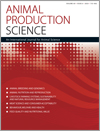Ver ítem
- xmlui.general.dspace_homeCentros Regionales y EEAsCentro Regional Buenos Aires SurEEA BalcarceArtículos científicosxmlui.ArtifactBrowser.ItemViewer.trail
- Inicio
- Centros Regionales y EEAs
- Centro Regional Buenos Aires Sur
- EEA Balcarce
- Artículos científicos
- Ver ítem
Feed bunk management effects steer performance and behaviour
Resumen
Animal performance and behaviour in fattening steers using ad libitum or restricted feed-bunk management were evaluated. High store-capacity self-feeders with weekly recharge were used in ad libitum management (ADLIB), while manual twice-a-day delivery was used in restricted management (REST). Twenty-four steers were allotted to 12 pens and fed with a high corn-grain diet without roughage, and randomly assigned to one of the treatments. Animal behaviour
[ver mas...]
Animal performance and behaviour in fattening steers using ad libitum or restricted feed-bunk management were evaluated. High store-capacity self-feeders with weekly recharge were used in ad libitum management (ADLIB), while manual twice-a-day delivery was used in restricted management (REST). Twenty-four steers were allotted to 12 pens and fed with a high corn-grain diet without roughage, and randomly assigned to one of the treatments. Animal behaviour was recorded every 5 min throughout 24 h for 3 days. No bunk-management effect was evident in bodyweight (P 0.95) or average daily gain (P = 0.91). Even though ADLIB resulted in higher dry-matter intake (P = 0.03), the animals spent less time per day eating feed than did those under REST (P < 0.01), with more eating sessions per day (P = 0.02), which were shorter (P = 0.06). Rumination time was greater (P = 0.07) under ADLIB than under REST, while the opposite was observed for time spent eating (P < 0.01). Resting time was longer in animals under ADLIB (P = 0.02), with more sessions per day (P = 0.06), than under REST. In conclusion, the two feed-bunk managements evaluated had no negative implications either for animal performance or behaviour.
[Cerrar]

Fuente
Animal production science AN18614
Fecha
2020-03-19
Editorial
CSIRO
ISSN
1836-0939
1836-5787 (Online)
1836-5787 (Online)
Formato
pdf
Tipo de documento
artículo
Palabras Claves
Derechos de acceso
Restringido
 Excepto donde se diga explicitamente, este item se publica bajo la siguiente descripción: Creative Commons Attribution-NonCommercial-ShareAlike 2.5 Unported (CC BY-NC-SA 2.5)
Excepto donde se diga explicitamente, este item se publica bajo la siguiente descripción: Creative Commons Attribution-NonCommercial-ShareAlike 2.5 Unported (CC BY-NC-SA 2.5)

